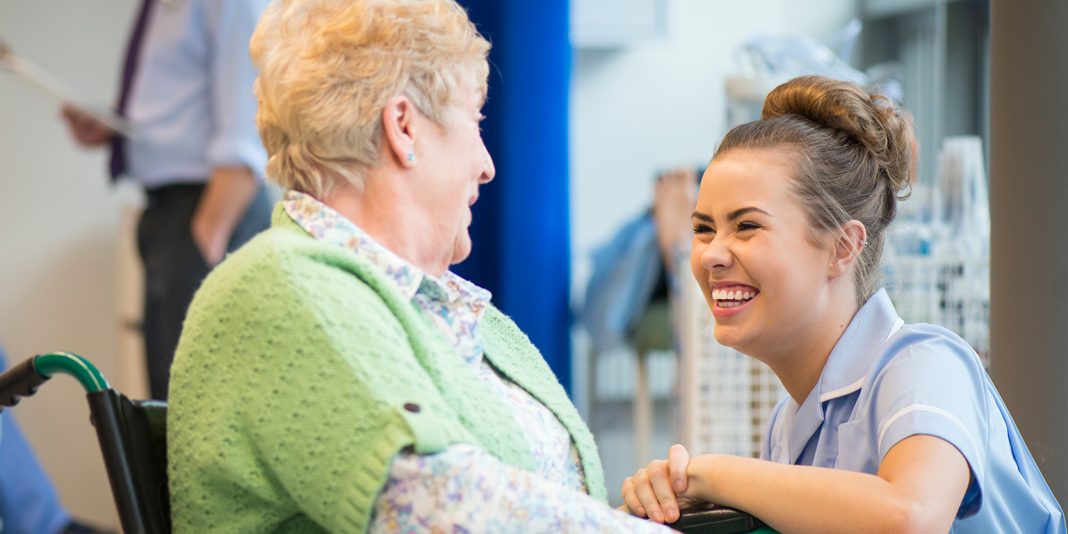Gerontology nurse specialist Dr Kathy Peri says that what has driven her many years in the field is the desire to support and provide person-centred care to vulnerable older people.
She embodied the spirit of this back in 2011 when, as director of nursing for older people’s health in Canterbury, she worked many days and nights in a row to ensure residents of severely quake-damaged rest homes could find safe havens.
Peri currently holds a joint position as a senior lecturer at the University of Auckland’s school of nursing, where she facilitates the master’s programme in dementia care, and as director of nursing at Totara Hospice South Auckland.
As part of sharing her passion for gerontology nursing, she often works in partnership with residential aged care and home care providers to support the development of person-centred models of care. Peri said one such partnership is the one she has with Hilda Johnson-Bogaerts at the Selwyn Foundation, which led to an invitation for her speak at the Foundation’s upcoming Gerontology Nursing Conference on the move to more resident-focused care, including aged care nurses and caregivers getting to know the stories behind the people they are caring for.
More staff and management buy-in key to person-centred care
To offer more person-centred care needs a “top-down, bottom-up approach”, said Peri, as it needed buy-in from both leadership and staff.
She said caregivers providing the intimate care with the older person already have some understanding of what shifting from task-based to person-centred care means to residents, but she was not so sure that management was always “quite on the same page”.
“And the RN – who is in the middle between the caregivers and the clinical manager – is just so busy doing their tasks, the medication, the dressings, the care planning and interRAI etc… they just don’t have time…
“And I think we need more staff to be able to be more resident-centred, to be honest,” said Peri. She said the physical environment and change the model of care can be changed but the reality is that the people going into residential aged care are much more frail than before and have a shorter length of stay and “the business model they are funded by has not really kept up”. She said a more resident-centred approach to caregiving was still needed but the truth was it did require more staff.
The older person themselves and their families also need to come on board, she said. “Often older people think rest homes are places to rest,” said Peri. Families who may have been looking after that loved one for years can also sometimes ‘suddenly pull back’ once their family member is in a facility. “Whether they feel restrained, can’t do it, or don’t want to do it, I don’t know,” said Peri.
Rich life stories to share
But families and friends can be key to delivering person-centred care as they can supply a resident’s life story that helps aged care nurses and caregivers to really get to know the people they care for.
“Older people have rich life stories and we sometimes forget that when we are looking after them in aged care facilities,” said Peri. “Not because we don’t want to, it’s just because we are so busy that we don’t have time to.”
She said if the patient themselves can’t tell their story, others need to help provide nurses elements of the story that can be embodied in a resident’s care plan.
“For instance, if they always played bridge on a Sunday, even if they now have some dementia, just sitting around a table with like-minded people with some cards might just be the ticket to make them feel themselves.”
She said some of this is also covered in cognitive simulation therapy (CST), an intervention for mild to moderate dementia that she and Dr Gary Cheung have trained about 200 health professionals in over the past 18 months, as some CST sessions focus on who the person is.
Peri acknowledged that the shift to delivering person-centred care was not cheap or simple, particularly with so much nursing energy having gone into interRAI.
But she said “hats off” to the big and small providers for all trying to do their best to see how they can provide better resident-centred care.
To do so leadership at the facility level was essential as often caregivers were “thirsty for change” but if the leadership team was too busy and did not have the capacity, or desire, to change “you were never going to make a difference”, said Peri. And you also needed adequate staffing numbers.
“But that doesn’t mean we give-up,” said Peri. “People like me are not giving up. Its my passion in life and its my desire to keep supporting anybody who comes to me as a gerontology nursing academic wanting support and advice to try something new.”
Technology can also play a role, such as the innovative seal robots that Selwyn Foundation and the university have been involved in. “I’m not saying that we are going to have robots running around as nurses – that won’t be happening. But we can certainly have robots doing some things to help the nurses along the way.”
Comparisons with US and Chinese facilities
Peri said she was surprised to find that many New Zealand age care facilities were probably “10 years ahead” in providing resident-centred care to several facilities she visited recently in Missouri and Mississippi.
“Their physical environment was a bit more trendy but their model of care was very old-fashioned, with residents having to get up, be dressed and down to the dining room for breakfast at 6.30am in the morning,” said Peri. “I was shocked. I think we are a little bit more progressive than I thought.” The facilities she visited in the States were all chosen as they were running cognitive simulation therapy (CST) and she wanted to find out how it was working for them.
Last year Peri also visited China where she was shown some selected residential aged care facilities and said the Kiwis were positively surprised by the fantastic models of care being delivered at the facilities they were taken to. “We weren’t able to go in and see dementia care – they were quite restrictive on what we could or couldn’t see but what we did see was very reassuring and patients were happy.”
Selwyn Foundation Gerontology Nursing Conference is being held in Auckland on 24 August. You can find out more here.






















